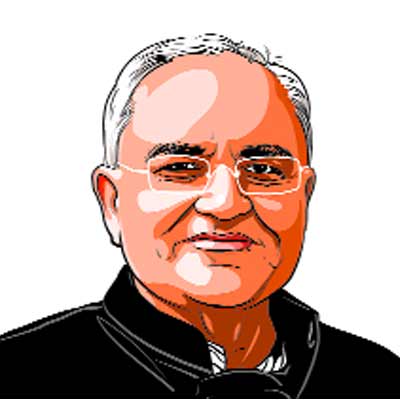Opinion On tackling ideology behind terror, we can’t hit pause
India has done well to contain terrorists’ infrastructure. Post-Pahalgam, it must also uproot their ideology.
 At Baisaran meadow where 26 people were killed. (File Photo)
At Baisaran meadow where 26 people were killed. (File Photo) The uneasy relationship between India and Pakistan has reached a flashpoint. The current standoff has been triggered by the terrorist attack on April 22 in Pahalgam in the Kashmir Valley, which left India spooked, seething, and the Narendra Modi government fuming. However, the dastardly attack and its aftermath have underlined some welcome trends and raised a few critical questions.
On April 24, addressing a meeting in Bihar, Prime Minister Narendra Modi, in a surprise move, switched from Hindi to English. His intent was clear: To send out a strong message to the entire world about India’s resolve to fight against terrorism. Modi said, “I say to the whole world: India will identify, track, and punish every terrorist and their backers. We will pursue them to the ends of the Earth.” Pakistan, too, has an aggressive stance. An official statement said, “Any attempt to stop or divert the flow of water belonging to Pakistan as per the Indus Waters Treaty… will be considered as an Act of War.”
This is not the first time that India-Pakistan relations have reached such a nadir. A few months after its birth in August 1947, Pakistan invaded Kashmir. Two full-scale wars between the two countries followed in 1965 and 1971. Kargil (1999) is another raw nerve in the chequered history of bilateral relations.
After its dismemberment (resulting in the creation of Bangladesh), the residual Islamic state changed its tactics. It has since been following the “bleed India with a thousand cuts” strategy. Over the past few decades, Pakistan has become a petri dish for terror and has been training and financing terrorists to unleash mayhem in various parts of India. Even when confronted with irrefutable evidence, Pakistan has consistently denied all allegations, maintaining a stance of injured innocence. The current situation is no different.
Pakistan’s Defence Minister, Khawaja Asif, distanced Islamabad from the blooshed. He said, “Pakistan has no connection with this… these are homegrown… Hindutva forces are exploiting the people, repressing minorities and exploiting Christians and Buddhists.” Asif’s statement sounds ludicrous given the fact that minorities — Hindus, Sikhs, Buddhists and Christians — are continuously persecuted in Pakistan. Linking the current massacre with “Hindutva forces” is a mischievous ploy — this ideological divide has nothing to do with India-Pakistan relations. Pakistan’s hostility to India is central to its existence and has no connection with the ideology of the party ensconced in Delhi or Islamabad. The 26/11 Mumbai carnage took place when the UPA was in power. The statement is a clear indication that nothing is going to change soon.
However, there is one welcome change in India. There are no dissenting voices. The country speaks against terror in one voice, cutting across ideological and political divides. The discordant notes one heard during the 2019 Pulwama attack on the security forces convoy and the surgical strike in response to the Uri attack in 2016 are missing. The bigger and more welcome transformation was seen in Jammu and Kashmir. The entire Union Territory openly came out against the savagery perpetuated by terrorists. The element of fear was gone. From Pahalgam to Srinagar in the Valley and Kishtwar to Doda in Jammu, towns witnessed massive protests and shutdowns last Wednesday. The protests at Lal Chowk against the massacre were symbolic of the changed ecosystem. This fabled city square used to witness protests in favour of terrorists. Now, it was the venue where Kashmiris expressed their outrage against senseless killings by the terrorists.
Why is India so shocked by this massacre? The country has endured far worse over the past decades. Things started changing after PM Modi came to power in 2014; India has significantly demolished the terror infrastructure. As a result, barring J&K and some Naxal-infested districts, the rest of the country has been free from terror for almost a decade now.
The relative peace lulled many into believing normalcy had been permanently restored in the Valley. It was a misplaced confidence. The British writer David Mitchell has put it succinctly: “Wars are never cured; they just go into remission for a few years.” The toxic cocktail of terror is made of two components: An ideology that believes that all belief systems other than its own are false and an insidious infrastructure to achieve ideological ends through violence and mayhem. The Indian state, over the past decade, has successfully destroyed the deadly infrastructure put together mainly by Pakistan.
It is, at best, a job half done. Because hardly any tangible efforts were made to combat the jihadi mindset and the intellectual paradigm that continues to produce mythological rakt beej (a demonic seed), reproducing itself many times over. In such a context, the notion of a pause in the ongoing war against terrorism is not only unrealistic — it is dangerously naive. This misconception largely stems from our tendency to view jihadi attacks in India in isolation from their broader civilisational context.
Benjamin E Mays, an American civil rights leader, was right when he said, “The tragedy of life is often not in our failure, but rather in our complacency; not in our doing too much, but rather in our doing too little; not in our living above our ability, but rather in our living below our capacities.” In the ongoing fight against terrorism, there can be no pause, no intermission.
The writer is a former chairman of the Indian Institute of Mass Communication (IIMC).




